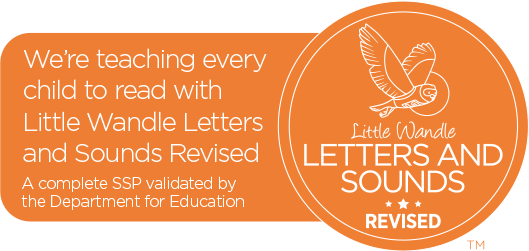Reading and Phonics
At Barnwell Academy we believe that reading is a skill which is taught through planned, systematic phonic lessons which lead to the enjoyment of books, the appreciation of different genres and the ability to access information independently.
Our aims:
-
To develop phonetic skills which lead to blending and reading fluently.
-
To promote confidence and positive attitudes to reading.
-
To equip pupils with the necessary comprehension skills required to develop an understanding of the texts they read.
-
To provide pupils with a wide range of different text genres and widen their understanding, knowledge and skills in reading.
-
To develop good home/school links that actively promotes reading.
Phonics in the Curriculum
At Barnwell Academy phonics is taught from Nursery to Year 1 using The Little Wandle Letters and Sounds Revised programme. The Little Wandle Letters and Sounds Revised programme applies seven key features that have been identified as characterising phonics teaching in highly successful schools. These are:
- direct teaching in frequent, short bursts
- consistency of approach
- secure, systematic progression in phonics learning
- maintaining pace of learning
- providing repeated practice
- application of phonics using matched decodable books
- early identification of children at risk of falling behind, linked to the provision of effective keep-up support.
In the Nursery phonics is taught throughout the curriculum focusing on exploring and investigating different sound including environmental sounds. This progresses to listening for letter sounds in words. From Reception to Year 1 discrete phonic sessions are taught daily. Pupils learn the alphabetical code and also how to blend and segment sounds to read and spell words.

Reading
At Barnwell Academy reading is embedded into all aspects of the curriculum. During discrete reading lessons from Reception to Year 1 decodable reading books are matched to the children's phonic knowledge. Collins Big Cat reading scheme books are used with the Little Wandle Letters and Sounds Revised programme. As children become fluent in reading Pearson Bug Club decodable books are used which also match children's phonic knowledge.
//www.youtube.com/embed/sHXYBfUxdS8
Teaching and Learning
Phonics is taught consistently across the school using the Little Wandle Letters and Revised structure. In Reception and Year 1 children are taught phonics daily with 3 discrete group reading sessions weekly.
Phonic lessons follow the revisit and review, teach and practise, and practise and apply model. The pronunciation and formation of sounds are taught using the same phrases throughout the school to ensure all children experience high quality and consistent teaching.
A sample Reception Lesson can be viewed here.
A sample Year 1 lesson can be found here.
School Library
The school library is available for all children from Reception to Year 6. In Reception and Year 1 the children will choose a book from a library selection within their classroom and bring it home to read and share. From Year 2 to Year 6 the children are encouraged to use the school library located in our main corridor. Each child may select a book and return it weekly (or sooner!). Our library days are:
Year 2: Monday
Year 3: Tuesday
Year 4: Wednesday
Year 5: Thursday
Year 6: Friday
To visit The Little Wandle Letters and Sounds website click here.
Reading at Home
As part of school homework we encourage children to read at home every day for a minimum of 10 minutes. Regular practice will increase your child's ability to read fluently and read for pleasure.
Your child will be receive reading books every week and also a home/school diary to enable parents to share their child's reading achievements.
Our reading scheme books start with Collins Big Cat Books for Little Wandle. These books match your child's phonic ability and should be read until your child can read them fluently. Pearson Bug Club may also be used which will also be matched to phonic ability.
As your child moves into Key Stage 2 they will access longer texts. Reading daily at home is still very important and your child should continue to read for a minimum of 10 minutes but will be increasing their ability to read for longer periods.
